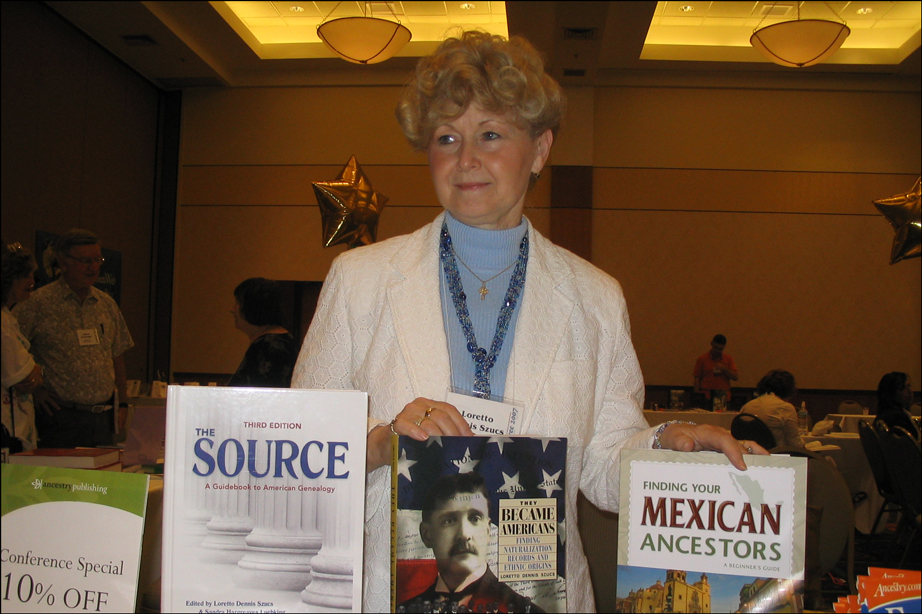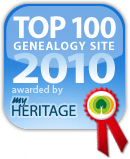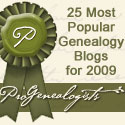The final session I attended at Jamboree 2007 was a panel discussion on Publishing Your Family History with experts Jim McNamara, Loretto (Lou) Dennis Szucs, and Tom Underhill.
Jim McNamara has a background in technical writing and is the British Isles Family History Society – USA Newsletter editor.
Lou Szucs at Jamboree 2007
Loretto (Lou) Dennis Szucs is executive editor and vice president of community relations for Ancestry.com. Some of Lou’s publications are The Source: A Guidebook to American Genealogy (co-editor Sandra Luebking), They Became Americans, Chicago and Cook County Sources, A Guide to the National Archives Field Branches (with Sandra Luebking), and Finding Answers in U.S. Census Records (with Matt Wright) .
Tom Underhill is publisher and senior designer at Creative Continuum, a company that designs and publishes short-run books.
Since the format of this session was a panel discussion, the information exchanged consisted of answers to questions from the audience. Q = Question, A = Answer, C = Comment.
Q: I’ve already written everything. What is my next step?
A:  Decide who your audience will be – who will want to read what you’ve written? Self-publish if the audience will be small.
Q: But I don’t want to self publish. I want to start at the top.
A: Most royalty agents don’t want to risk publishing if they can’t make money on the venture. A smaller publisher will give you full control over your book. You will still own the copyright and control, and you can always go to a larger publisher later on.
Q: Might there not be academic presses that would be interested? Where can I publish my ancestor’s Civil War Diary?
A: Go to a genealogy society in the area where your ancestor lived. Submit a smaller article to a military magazine first – this may launch an opportunity for a larger article. GuterbergPress.org is a way to self-publish, but you’ll be giving your work away.
Q: How do I start to write my Family History?
A: Take a life history writing class. Get a lot of criticism. Go to the Southern California Genealogical Society writer’s group and have them criticize your writing.
C: Think about what made your ancestors’ lives different. What was everyday life like? Read historical fiction to see how other authors paint the setting. Use all five senses when writing. Write about saddling the horse, opening the door. Describe emotions.
Q: My grandfather wrote a book that is out of print. What can I do with it?
A: Find out if the book is still under copyright. If it is, you will need the permission of the heirs – the people who now own the copyright – to reprint it. If the book is out of copyright, you can just reprint it.
Q: How many copies should I print?
A: Find out where the breakpoint is for cost. It may be less expensive to print the number of copies you need plus 25 extra than it will cost if you print a number of copies and then have to print 3 more.
C: Nobody is publishing their information. More people should publish and deposit their family history in the Family History Library. If the book needs to be revised later, the author can always print a new edition. The value of loose papers is much less than that of a published book.
Q: What should I write about? Why would anyone want to read what I’ve written?
A: I would read what you write because nobody else has your experiences. In two generations, what you write will be ancient history. Wouldn’t you love to have a family history published by your ancestors?
Q: What’s your impression of print-on-demand services like Lulu?
A: Books from print-on-demand services are as good as the person who designs the book. Paperback books will not be archival quality.
Q:  How should I publish transcriptions of county records?
A: A book version of transcriptions is designed to last, even if most people want a searchable digital form.
Q: How do people find these family histories?
A: Publishers promote books to suitable groups.
C: Don’t trust everything to electronic media. It’s better to save to paper to ensure longevity.
Q: What advice can you give for indexing a family history?
A: In an index, more detail is better. An index entry for “Smith, John, marriage”, or “Smith, John, career” is more useful than just “Smith, John”. An entry such as “Smith, John, born 1824” is more useful than just “Smith, John” when many people have the same name. Highlight what you want to index in the text. Don’t trust the computer to index itself.
Q:  What about citing sources?
A: Most people don’t read the sources, although sources help to prove the accuracy of the material and may help others find addition information.
C: Include maps of the time period. Show how things have changed. Draw maps and tell stories.
C: Some publishers will design, scan, and manage your book. Some require you to do everything on your own.
Q: I like to write fiction. How can I get my book published?
A: There are many examples of people who self-published their book, and then the book was picked up by a major publishing house. If you sell 1000 copies of a self-published book, you stand a better chance of being picked up by a major publishing house than if you sell only a few copies.
Copyright © 2007 by Stephen J. Danko




